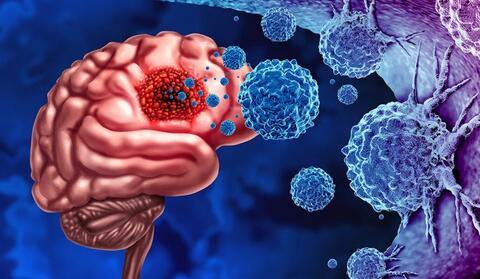
In a new study, Yale researchers describe how a novel chemical compound attacks drug-resistant brain tumors without harming healthy surrounding tissue.
The research, published in the Journal of the American Chemical Society, is a crucial step in the development of so-called “chameleon compounds” that may be used to target an array of pernicious cancers.
Every year, an estimated 20,000 Americans are diagnosed with glioma, a malignant tumor in the brain and spinal cord. Of those cases, about 13,000 are glioblastomas, the most aggressive subtype of malignant brain tumor among adults.
For decades, glioblastoma patients have been treated with a drug called temozolomide. However, the majority of patients develop resistance to temozolomide within a year. The five-year survival rate for glioblastoma patients is less than 5%.
In 2022, Yale chemist Seth Herzon and Yale radiation oncologist Dr. Ranjit Bindra developed a new strategy for targeting glioblastomas more effectively. They created a class of cancer-fighting molecules — chameleon compounds — that exploit a defect in a DNA repair protein known as O6-methylguanine DNA methyltransferase (MGMT).
In many cancer cells, including glioblastomas, the MGMT protein is missing. The new chameleon compounds are designed to damage DNA in tumor cells that lack MGMT. The chameleon compounds initiate DNA damage by depositing primary lesions on DNA that evolve over time into highly toxic secondary lesions known as interstrand cross-links. MGMT protects the DNA of healthy tissue by repairing the primary lesions before they can transform into the deadly interstrand cross-links.
For their new study, co-corresponding authors Herzon and Bindra focused on their lead chameleon, KL-50.
“We used a combination of synthetic chemistry and molecular biology studies to elucidate the molecular basis for our earlier observations, as well as the chemical kinetics that give rise to the unique selectivity of these compounds,” said Herzon, the Milton Harris ’29 Ph.D. Professor of Chemistry in Yale’s Faculty of Arts and Sciences. “We show that KL-50 is unique in that it forms DNA interstrand cross-links only in a DNA repair defective tumor. It spares healthy tissue.”
It is an essential distinction, the researchers said. A number of other cancer-fighting compounds have been developed that trigger interstrand cross-links — but they are not selective for tumor cells, which limits their utility.
The secret to KL-50’s success is in its timing, the researchers said. KL-50 generates interstrand cross-links more slowly than other cross-linking agents. This delay gives healthy cells enough time to use MGMT to prevent the cross-links from occurring.
“This unique profile suggests its potential for the treatment of drug-resistant glioblastoma, an area of great unmet need in the clinic,” said Bindra, the Harvey and Kate Cushing Professor of Therapeutic Radiology at Yale School of Medicine. Bindra is also scientific director of the Chênevert Family Brain Tumor Center at Smilow Cancer Hospital.
Herzon and Bindra said that more broadly, their research underscores the importance of considering the rates of chemical DNA modification and biochemical DNA repair. They say they can use this strategy to develop treatment for other cancers harboring specific, tumor-associated DNA repair defects.
Herzon and Bindra are also members of the Yale Cancer Center.
The first author of the study is Eric Huseman, a former Yale researcher who is an assistant professor of chemistry at Marquette University. Co-authors from Yale include Anna Lo, Olga Fedorova, James Elia, Susan Gueble, Kingson Lin, Ranjini Sundaram, Joonseok Oh, Jinchan Liu, Fabian Menges, Victor Batista, Jason Crawford, and Anna Pyle. Other co-authors were Matthew Rees, Melissa Ronan, and Jennifer Roth of the Broad Institute of MIT and Harvard.
Funding for the research came from the National Institutes of Health, the U.S. Department of Defense, the Yale Cancer Center, and Modifi Biosciences. Herzon and Bindra are co-founders of Modifi Biosciences, which has licensed the exclusive rights to the findings from Yale University.
media contact
Michael Greenwood: michael.greenwood@yale.edu, 203-737-5151